This post contains affiliate links.
Discover essential tips for raising backyard chickens. Learn about what to expect from your flock, daily care routines, feeding, and hen behavior. Perfect for beginners looking to start their own backyard flock.
Raising a flock of backyard chickens is a very rewarding and enriching experience, providing a source of fresh eggs, natural pest control, and endless entertainment. It also comes with its own set of responsibilities and challenges. Whether you’re a seasoned poultry keeper or a curious beginner, understanding what to expect from your hens is crucial for their well-being and your peace of mind.
This guide delves into the essential aspects of raising backyard chickens. By familiarizing yourself with these need-to-know facts, you’ll be well-equipped to nurture a happy and productive flock in your backyard.
Top Essential Things to Consider Before Getting Backyard Chickens
When thinking about raising chickens, there are many factors to consider. Your backyard flock is a delightful addition, but you’ll need to plan carefully to ensure success. First and foremost, check local laws and ordinances to see if you’re allowed to keep backyard chickens in your area. Some places may have specific requirements about the number of hens you can keep or even prohibit roosters due to noise.
Next, decide whether you want to start with hatching eggs, day-old chicks, teenagers, or adult birds. Each option has its advantages and challenges, therefore think about what suits your lifestyle and experience level best. Once you’ve decided on the type of chickens, research the different breeds to find those that will thrive in your climate and meet your expectations for egg production and temperament.
I purchased my chickens as pullets which are considered “teenagers”. All of my chicken’s are well tempered, however out of the breeds Carmel my Buff Orpington is the most docile, yet dominant, and Duckey my Cuckoo Maran is sweet and is the most shy and apprehensive of the group.
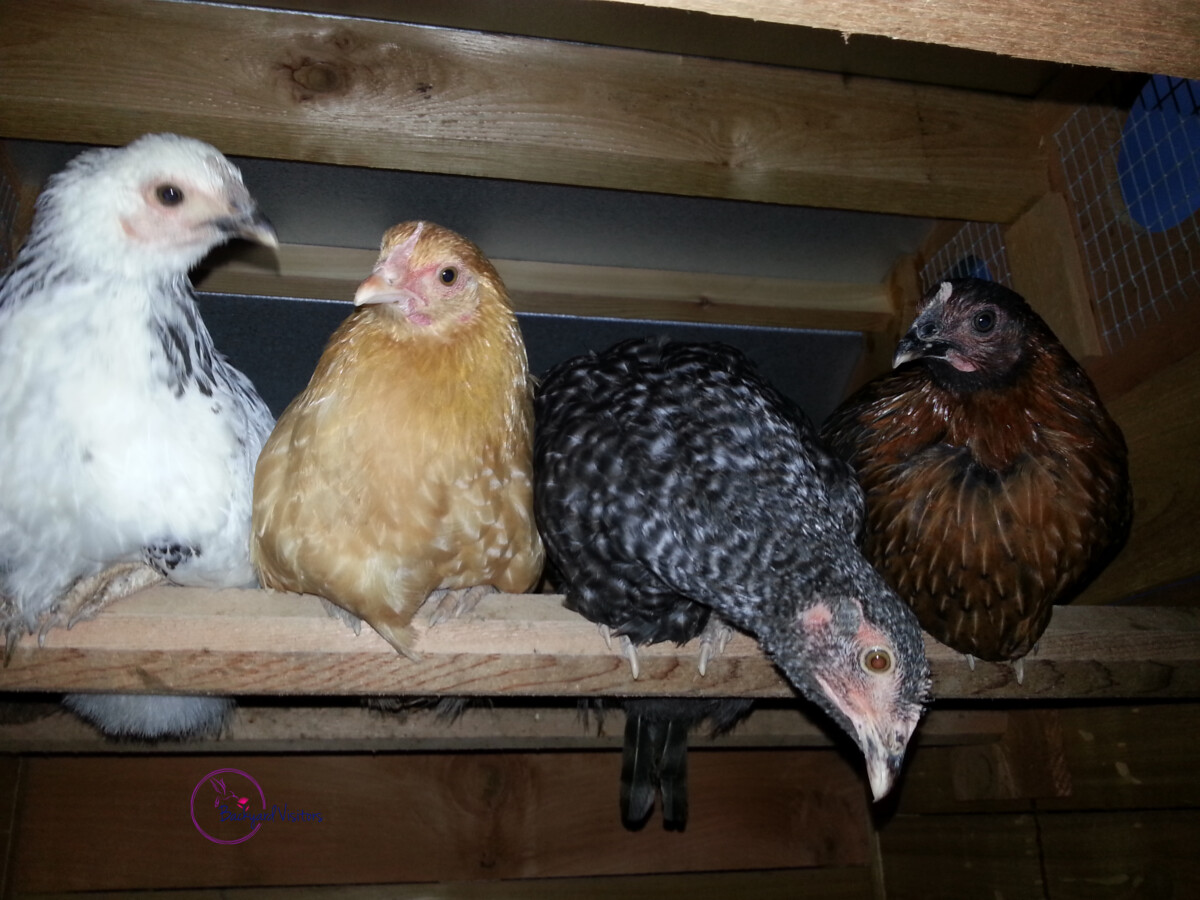
Cuckoo Maran (Duckey), and Ameraucana (Molasses)
Ensure your location has enough space for a proper chicken coop and run, and plan for potential predators. Building a DIY coop is a popular choice, but whether you build or buy, make sure it has adequate ventilation and is kept dry and clean.
Additionally, think about your daily schedule, as raising chickens does require regular care and attention. You’ll need to provide the right feed and supplements to keep your flock healthy. Free-ranging is an option, but consider the risks and whether your backyard is secure enough. Maintenance of the coop is another critical element. Keep a checklist of essentials and be prepared for health issues or emergencies that may arise.
Finally, consider where you’ll get your flock. Local farmers, online hatcheries, and community events are great sources for finding the right chickens to get started. By keeping these essential things in mind, you’ll have a well-prepared start with your backyard flock, setting yourself up for a rewarding experience with your feathered friends. Raising chickens is a fulfilling way to enjoy home-grown eggs and the joy of keeping animals.
Read my other related articles:
- The Basics of Backyard Chicken Keeping: What You Need to Know
- Deciding If Backyard Chickens Are Right for You
- Understanding Local Regulations for Keeping Chickens
- The Initial Costs and Setup for a Backyard Chicken Coop
- Daily and Weekly Care Routines for Healthy Backyard Chickens
- Common Myths About Keeping Chickens Debunked
- How Chickens Contribute to a Balanced Ecosystem at Home
Local Laws and Ordinances for Your Backyard
Before you dive into the delightful world of backyard chickens, familiarize yourself with local laws and ordinances. Each location has its own set of rules and zoning requirements that dictate how many hens you can keep, where you can place your chicken coop, and any restrictions specific to your area. Don’t run into legal issues after introducing your flock, therefore plan accordingly and stay updated with local news on these ordinances.
One of the first things you need to do is check if your location permits backyard chickens. Many urban settings have restrictions or special requirements. Some places only allow a certain number of hens and may ban roosters altogether due to noise ordinances. Furthermore, different neighborhoods may have zoning laws that separate residential from agricultural land.
Living in a large homestead setting may offer more freedom compared to a densely populated urban backyard. However, a well-designed coop and a bit of backyard space, chickens are perfectly happy and lead healthy lives even in an urban setting.
Understand all the rules and confirm if you need any permits. It’s a good idea to contact your local city hall or municipal offices to get the most accurate and updated information. These offices provide details on everything from minimum coop sizes to how far away your backyard chickens must be kept from property lines. While these steps may seem burdensome, it’s essential to start off on the right foot with your flock to avoid fines or forced removal of your hens.
Remember, planning and adherence to these local laws will ensure your journey with backyard chickens is stress-free. Understanding and following your location’s specific ordinances help not only in creating a harmonious environment but also in fostering good relationships with your neighbors who may have concerns about you raising hens in your backyard. Being well-informed and prepared reflects your commitment to your new adventure and aids in making it a rewarding experience without any unexpected legal surprises.
5 Local Laws And Ordinances Every Backyard Chicken Owner
Needs To Know
- Zoning Restrictions: Before starting your backyard chicken project, verify if your local zoning laws permit raising chickens. Some areas may have specific zones where poultry keeping is either allowed or prohibited.
- Permit Requirements: Many municipalities require permits or licenses to raise chickens. Check if you need to apply for a backyard chicken permit and ensure you comply with any associated fees or application processes.
- Flock Size Limits: Most local ordinances specify a maximum number of chickens you can keep. This limit is based on the size of your property and local health and safety regulations.
- Setback Regulations: There are often regulations about how far chicken coops must be from property lines, homes, and neighboring properties. These setback requirements help minimize disturbances and odor issues.
- Noise and Sanitation Standards: Ordinances generally cover how to manage noise and cleanliness. Roosters may be prohibited due to noise concerns, and there are usually rules about maintaining clean coops to prevent odors and pest problems.
Should I Get Hatching Eggs, Day-Old Chicks, Pullets or Adult Birds?
When considering raising chickens for your backyard flock, you’ll need to decide on the right age group. Should you get hatching eggs, day-old chicks, pullets, or adult birds? Each option has its unique advantages and challenges, and what you choose will depend on your experience level, your desire to interact with the birds and the time and resources you’re willing to invest.
If you’re up for a true adventure, beginning with hatching eggs is incredibly rewarding. Watching your eggs hatch into baby chicks is a magical experience, but it requires an incubator and diligent care. This option is optimal for those who have some patience and are keen to witness the entire development process. Prepare for some sorrow, as not all eggs may hatch.
Day-old chicks are a popular choice for new chicken keepers. Purchasing day-old chicks gives you the opportunity to bond with them right from the start. They require a brooder with specific temperature controls, and you’ll need to teach them how to drink and eat. However, raising day-old chicks allows you to control their diet and health from an early age, ensuring that they grow up healthy and strong.
Opting for pullets aka teenagers is a great middle-ground choice. These chickens are past the fragile baby stage and require less intensive care. Pullets are on their way to becoming full-fledged hens and will begin laying eggs soon, which many find very exciting.
I purchased my five chickens as pullets, therefore I did not deal with the chick stage of my chickens’ lives.
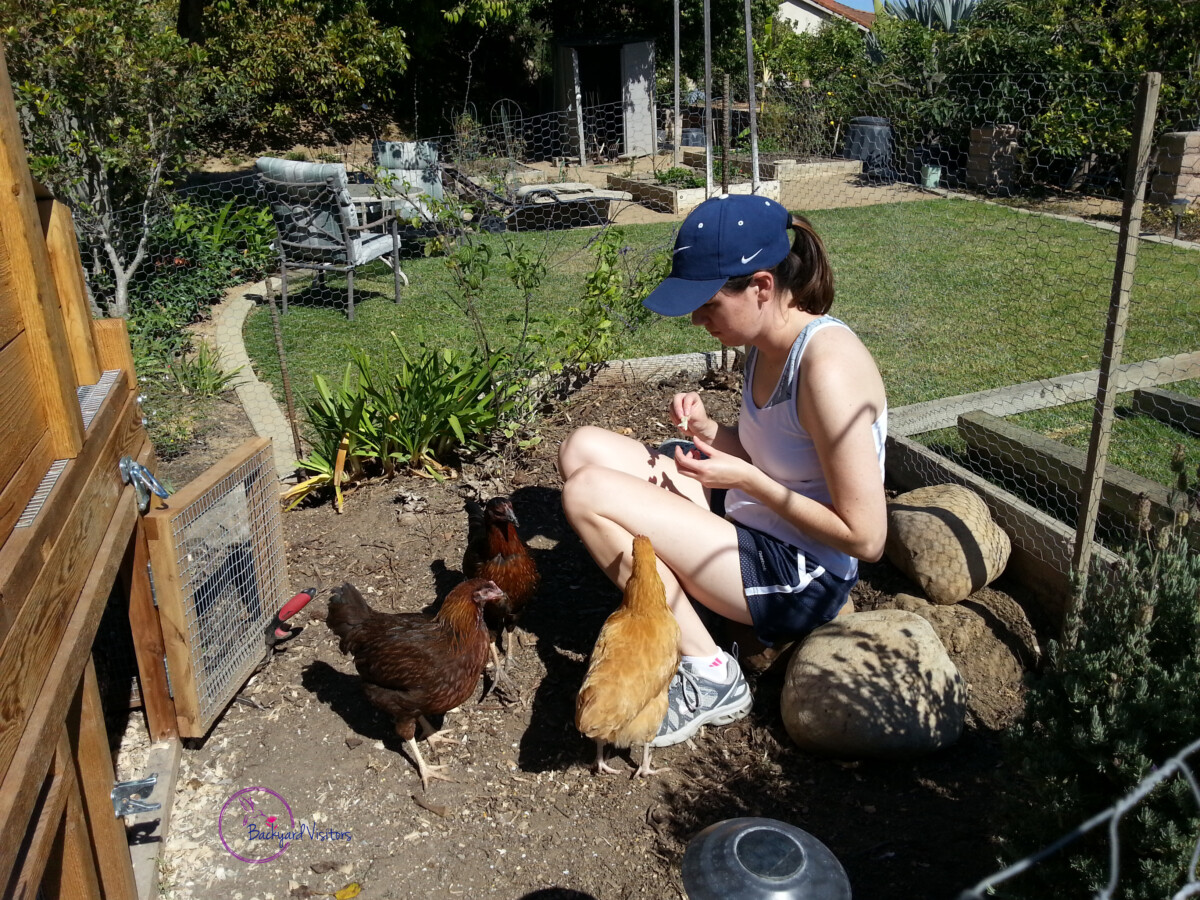
Finally, if you want instant egg production and don’t have the time for extensive care, adult birds or laying hens may be the way to go. Keep in mind that older birds may come with unknown health issues, so always check the birds’ health status before introducing them to your backyard flock. Whichever age you choose, raising chickens is a fulfilling and delightful journey!
Where to Get Your Flock of Backyard Chickens
When you’re ready to get your flock of backyard chickens, the first thing to consider is where to obtain your birds. There are several resources to help you get started with raising chickens, but finding the right source depends on your location and plan.
Many backyard chicken owners choose to start with baby chicks from local hatcheries or farm supply stores. These baby chicks are easily found in the spring at retailers focused on agricultural supplies. Some people prefer to order their chicks online from reputable hatcheries, which often have a wider selection of breeds to choose from.
I purchased pullets aka “teenagers” from my local farm supply store. They were old enough where I did not need a heating lamp, yet young enough where they needed to be imprinted to their home and were not ready to lay eggs. I had to wait until they were 20 weeks old (approx 5 months) before they started regularly laying eggs.
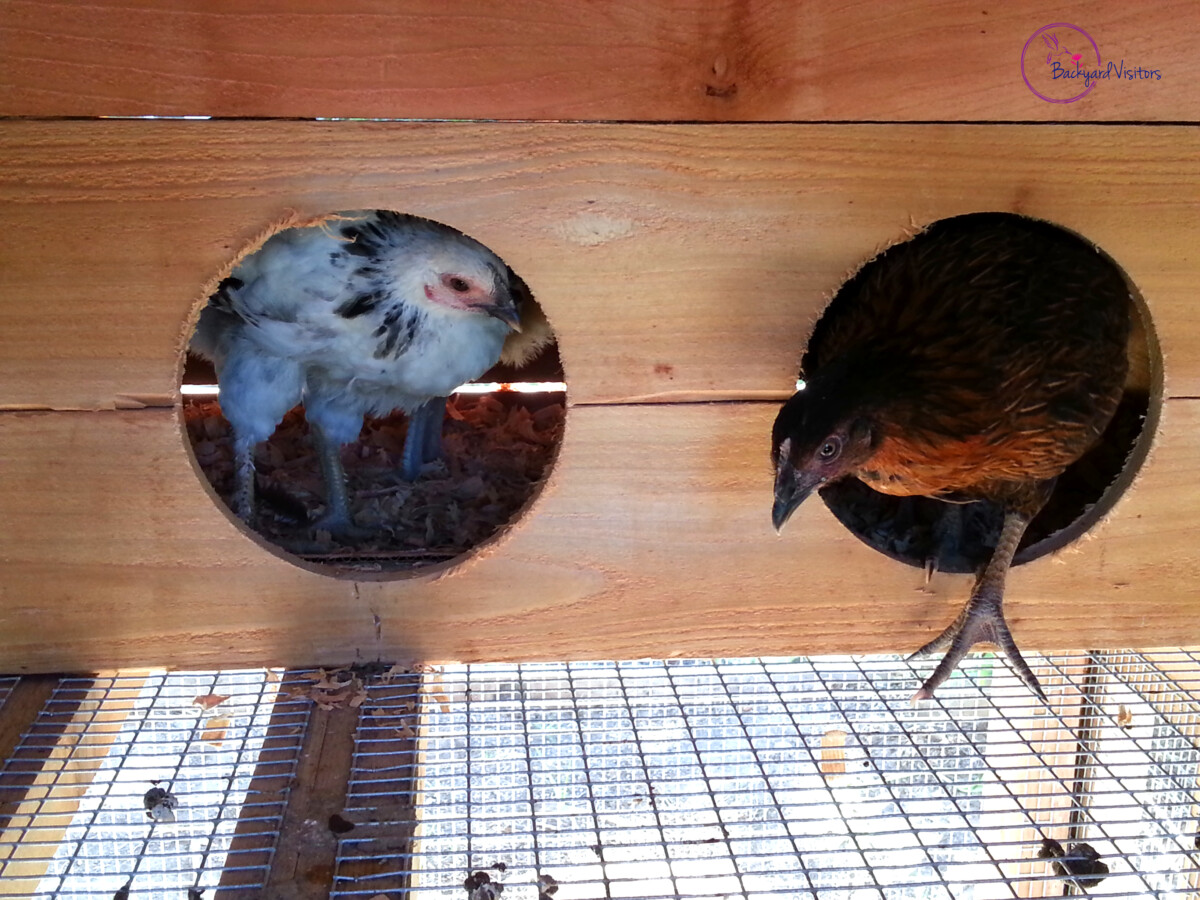
Right: Olive (Australorp)
In the nesting boxes.
If your plan involves raising hens that are already laying, check local ads or websites where people sell older chickens. Farmers who are updating their flocks may have a few hens available. Another great way to get your flock is through chicken swaps or fairs, where farmers and hobbyists meet to buy, sell, and trade chickens. Make sure to find reputable sources to ensure the health and well-being of your backyard flock.
Once you’ve decided where and how to get your flock, make a list of supplies that you will need. New chicks need brooding equipment, heat lamps, and specific feed to get a strong start. Adult birds require a different set of supplies, such as a coop, nesting boxes, and a good quality layer feed. Do not forget essentials such as waterers, feeders, and bedding materials. It’s crucial to have everything ready before your chicks or hens arrive.
Running a DIY chicken coop is rewarding, and there’s plenty of resources online about building one from scratch. However, for beginners, pre-made coops may be the way to go as it saves on time. No matter where you choose to get your flock of backyard chickens, ensure their environment is safe and fit for their needs. This preparation will set you on the right path with your new backyard flock, making raising chickens a more enjoyable experience.
Chicken Coop and Run Essentials for Keeping Your Birds
One of the first things you’ll need to plan for when raising chickens is your chicken coop and run. These essentials are crucial for keeping your birds safe, comfortable, and happy. The location of your coop should be dry, well-ventilated, and easy to access from your house.
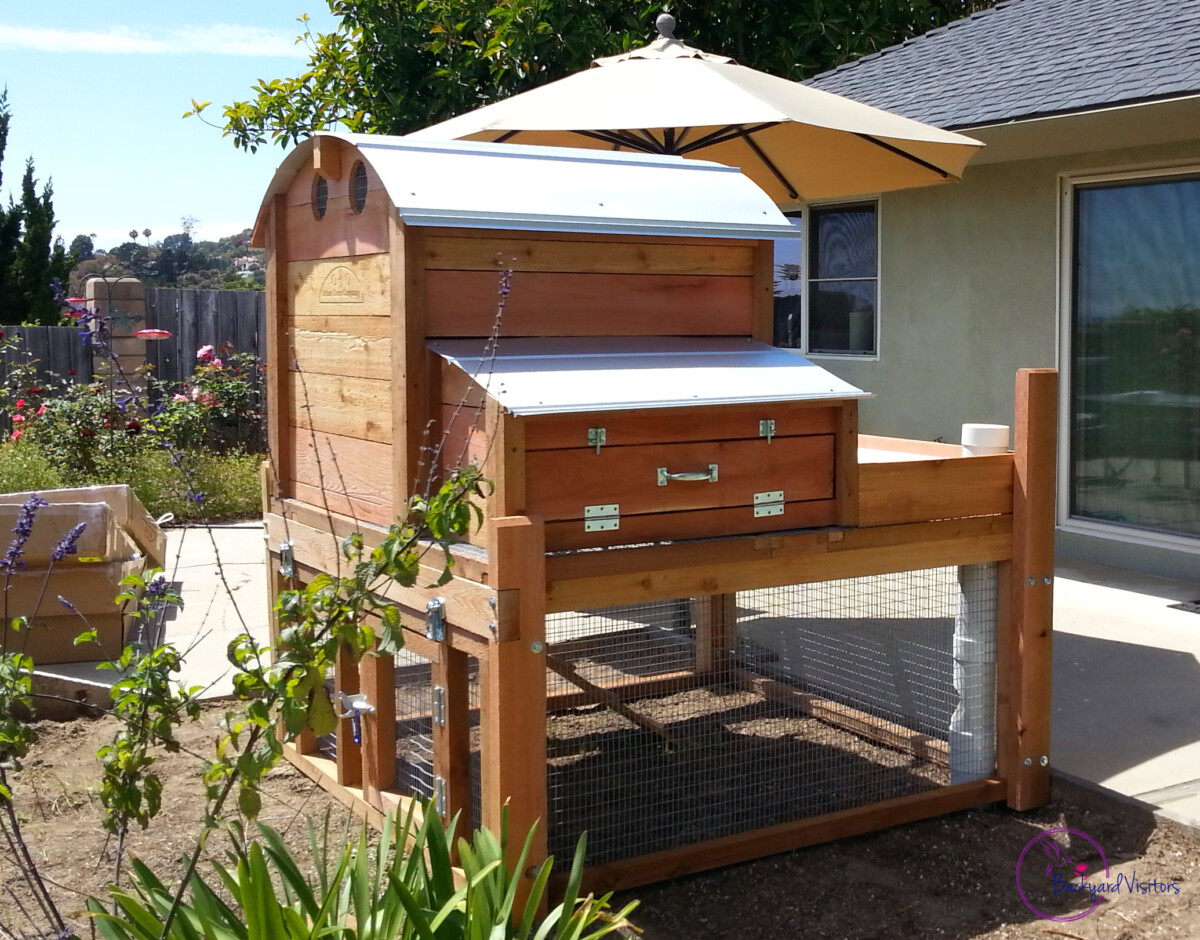
When setting up the coop, make sure it provides enough space for all your hens to roost and lay eggs. You will also want to add nesting boxes, which give your flock a secluded spot to lay their eggs. The general rule of thumb is to provide at least one nesting box for every three to five hens.
The yard and the run are also vital parts of the setup. These areas should be secure and spacious enough for exercise. Consider a DIY run if you’re handy; it will save you some money while still being customized to your yard’s layout. Fencing is essential to keep predators out and your birds in. Include some shaded areas to protect your chickens from the sun.
I built my attached chicken run to allow my chickens plenty of space to roam. My run is 8’ wide and 40’ long. That equates to 64 square feet for each of my five chickens.
My coop and run is on the east side of my house therefore they are in the shade from noon until the rest of the afternoon.
Clean the coop regularly to prevent the buildup of ammonia and other harmful substances. Keeping the run dry will help avoid parasitic infestations. Having proper drains or slightly elevating the ground keeps water from pooling. The well-being of your backyard chickens greatly depends on the environment you provide. A happy flock will reward you with delicious, fresh eggs and a satisfying hobby. It’s worth investing the time and effort into a well-planned setup.
Whether you’re a seasoned pro or just starting, these coop and run essentials are the backbone of successfully keeping chickens. With careful planning and regular maintenance, you’ll find that raising chickens is a rewarding and enjoyable endeavor. Your chicken coop and run are where it all begins, so make sure they are ready to house your feathered friends.
Maintain a Dry and Clean Coop
Maintaining chickens requires attention to detail, especially when it comes to keeping their coop dry and clean. The cleanliness of the coop directly impacts the health and well-being of your flock. Raising chickens in a dry environment reduces the risk of mold and harmful bacteria that will cause health issues for your hens and chicks. Make it a habit to regularly check and replace bedding, ensuring the coop remains sanitary. A clean coop facilitates better hygiene for a healthy flock.
Another key aspect of coop maintenance is managing moisture. Providing proper ventilation helps to keep the coop dry. Use bedding materials such as wood or pine shavings that absorb moisture. Avoid hay or straw as bedding since they harbor mold when wet. However, many chickens prefer straw to create nests for egg laying. Therefore, if you choose straw, replace the bedding frequently.
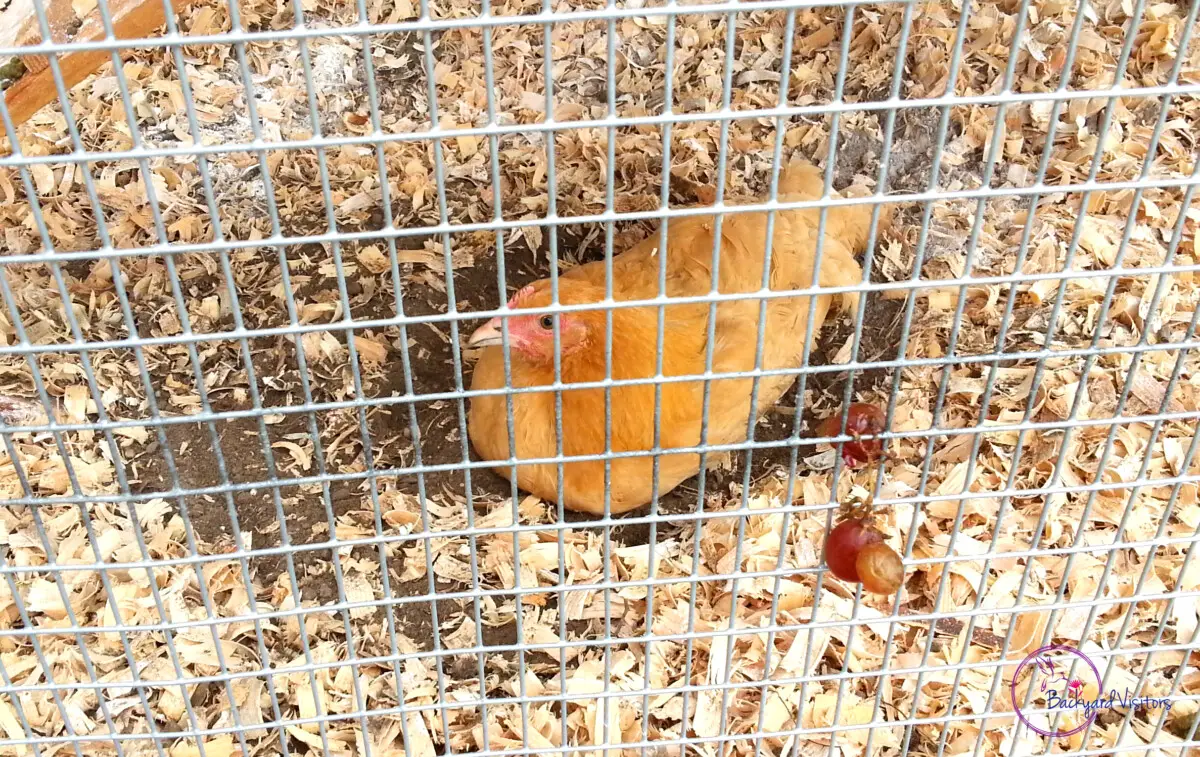
It’s also essential to monitor and manage water spills from feeders or waterers. By maintaining a dry environment, you reduce the chances of respiratory problems and infections among your backyard chickens.
The run should be equally attended to, as it is part of your chickens’ daily environment. Regularly rake and replace the ground cover in the run to prevent buildup of waste. This practice not only keeps the area clean but also provides a healthier space for your chickens to scratch and peck. Your flock will thrive in a cooperative, well-maintained setting where hygiene is prioritized.
The effort you put into maintaining the coop directly affects the overall health of your flock. A clean environment means fewer pests and parasites, leading to happier, healthier hens. Raising chickens is rewarding and by paying attention to the cleanliness of the coop you are ensuring a healthy and productive flock. Keep your coop dry, keep it clean, and watch your backyard chickens flourish in their well-cared-for home.
Should I Let My Chickens Free-Range in My Backyard?
The perks of having backyard free-range chickens allow the chickens to roam freely while they naturally forage for insects, seeds, and fresh greens. This makes the chickens healthier and also reduces your feed costs. However, before getting started with free-ranging, there are several important factors to consider when planning.
First, evaluate if your backyard location is safe for the flock. You need a secure, predator-proof area to ensure the safety of your hens. It’s prudent to check for common predators in your neighborhood and take measures to protect your chickens. A large fenced yard will prevent the chickens from wandering off while keeping them protected from traffic and neighbors’ pets.
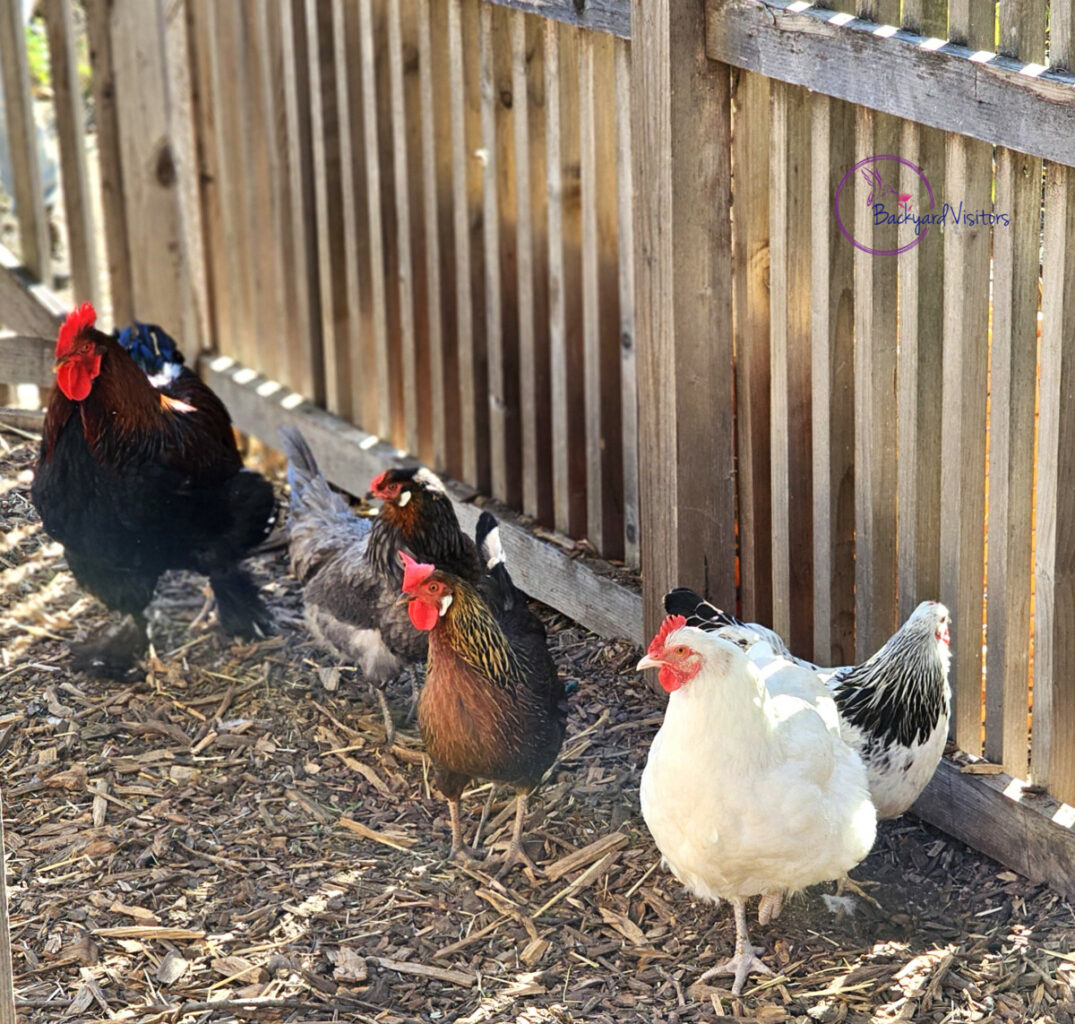
Second, consider the coop and run setup. A primary coop should act as a safe haven where the chickens will retreat when they feel threatened or to roost at night. Ensure that the coop is always accessible for protection when the chickens are free-ranging.
An adequately sized chicken run also offers a controlled environment for the chickens to be outdoors when it’s not suitable to let them wander the entire backyard.
While the benefits of free-ranging are many, for instance, pest control and a varied diet which ensures healthier and happy birds, plan out the time needed to supervise the flock.
There are numerous advantages to free-ranging birds, such as pest control and a diversified diet that guarantees healthier and happier birds. Schedule out the time needed to supervise your flock.
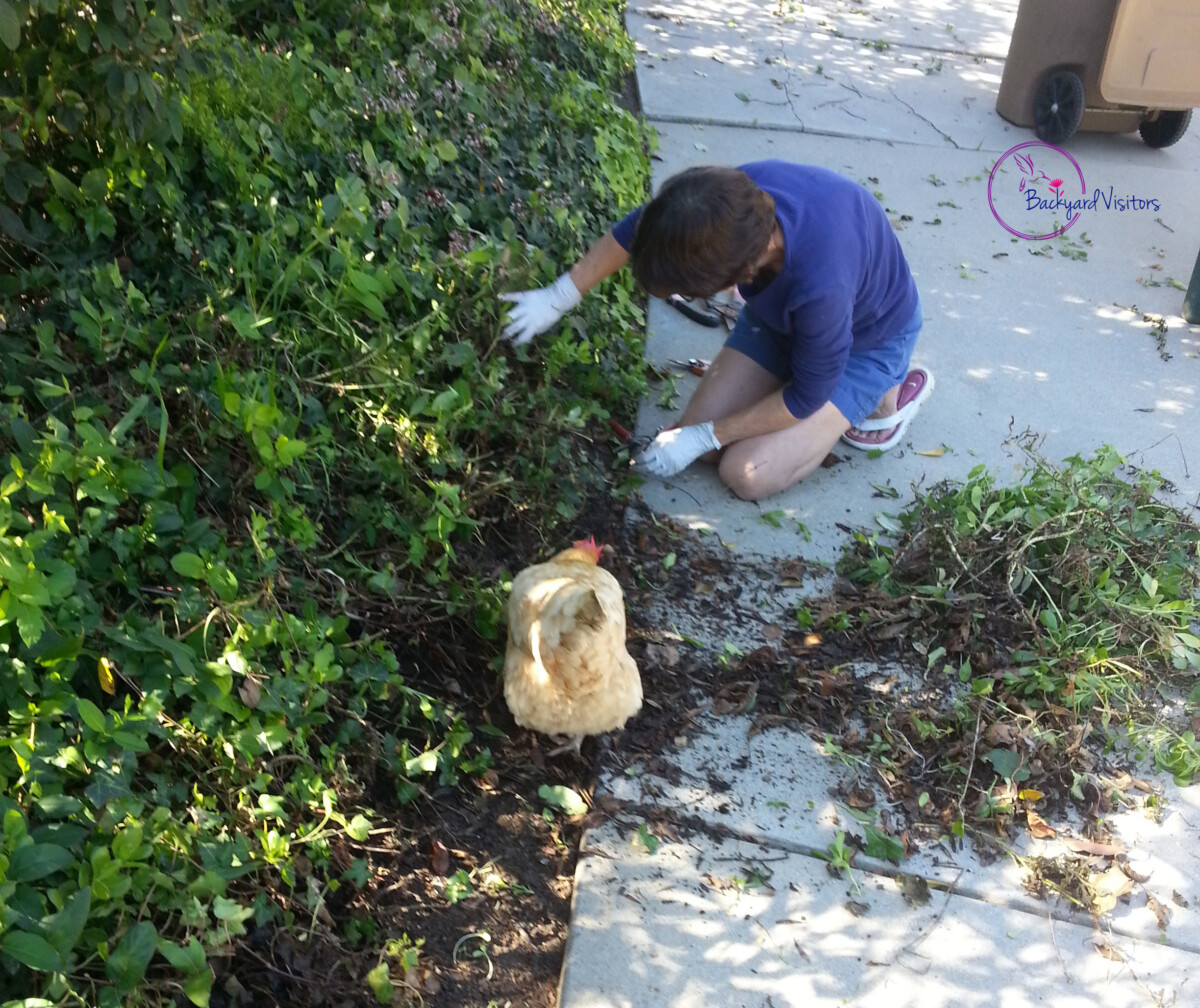
Free-ranging does require time and effort to monitor the chickens and ensure they are safe from predators and other hazards. Ultimately, raising chickens in a backyard setting with the right planning and meeting all the necessary requirements is a delightful and beneficial experience. If you meet the conditions, your hens will thank you with healthier lives, better egg production and an engaging and enjoyable backyard chicken-keeping experience. Always keep their safety and well-being in mind and make a balanced decision for both you and your flock.
Pros of Free-Range Chickens:
- Better animal welfare: Chickens have more space to roam and engage in natural behaviors.
- Higher quality eggs: Free-range chickens often produce eggs with richer yolks and better flavor.
- Reduced stress: Increased space and natural light reduce stress and anxiety in chickens.
- Fewer health issues: Access to the outdoors will strengthen immune systems and reduce diseases.
- Environmental benefits: Manure distribution in free-range systems is more environmentally sustainable.
- Consumer demand: Increasing number of consumers prefer products from ethically raised animals.
- Better diet: Access to a variety of insects and plants will lead to more nutritious eggs and meat.
Cons of Free-Range Chickens:
- Higher costs: Free-range systems can be more expensive due to land and maintenance costs.
- Predation risks: Chickens are more vulnerable to predators when roaming outdoors.
- Weather dependent: Adverse weather conditions will affect the well-being of free-range chickens.
- Inconsistent production: Variations in environment will lead to inconsistent egg production.
- Supervision required: Increased space requires more management to ensure chicken safety and health.
- Biosecurity challenges: Greater risk of exposure to external pathogens and parasites.
- Regulatory compliance: Adhering to free-range certifications and regulations can be complex and costly.
What to Feed Chickens & Providing Supplements
When raising chickens, one of the most crucial aspects is understanding what to feed chickens and providing the right supplements. Proper nutrition ensures your flock stays healthy and produces strong eggs. The main feed for your backyard chickens will include a balanced mix of grains, proteins, and essential nutrients.
Commercially available chicken feed is formulated to meet their nutritional needs, but you can also mix your own for a DIY approach. When planning your feed, make sure to include a variety of grains such as corn, wheat, and oats. Some backyard chicken owners provide soybean meal or fish meal as a protein source, especially for laying hens.
My chickens fulfilled their protein requirements by being free-range daily. They have access to my compost, where they eat worms and bugs to their heart’s content. I also give them dried mealworms as a treat daily for additional protein.

All I have to do is shake the container, and they come running!
Supplements play a significant role in maintaining the health and productivity of your flock. Oyster shells or crushed eggshells provide the necessary calcium for strong eggshells. Grit, which is small stones, helps chickens digest their feed properly. Vitamins and minerals, available in premixed form, can also be added to their feed to ensure they get all the nutrients they need.
Incorporating kitchen scraps offers variety and additional nutrition. Just be cautious to avoid feeding them anything toxic to chickens, such as avocado or chocolate. Ensure that scraps are fresh and not moldy or spoiled. It’s important to provide a balanced diet, therefore kitchen scraps should only be a supplement to their main feed.
If you are starting with chicks, their feed requirements differ from adult birds. Chick starter feed is higher in protein to support their rapid growth. As they mature, transition them to grower feed and eventually to layer feed as they begin laying eggs.
Consistent access to clean water is just as important as their feed. A well-planned diet will ensure your backyard chickens live healthy lives and maintain their egg-laying capabilities. Monitoring the condition of your hens regularly will help you adjust their diet and supplements as needed to keep the flock thriving.
Kitchen Scraps that Chickens
“Can” Eat
- Apples (remove seeds)
- Bananas
- Berries
- Melons (including seeds)
- Grapes
- Peaches
- Pears
- Carrots (raw or cooked)
- Cabbage
- Cauliflower
- Broccoli
- Pumpkins
- Squash
- Cucumbers
- Zucchini
- Lettuce (avoid iceberg)
- Spinach (in moderation)
- Sweet Potatoes (cooked)
- Rice (cooked)
- Pasta (cooked)
- Bread (in moderation, avoid moldy bread)
- Beans (cooked, never raw)
- Quinoa (cooked)
- Eggs (cooked, never raw)
- Meat scraps (cooked, in moderation)
- Fish (cooked, without bones)
- Cheese (in moderation)
- Yogurt
- Nuts (unsalted and in moderation)
Kitchen Scraps that Chickens
“Cannot” Eat
- Avocado (especially the pit and skin)
- Chocolate
- Onions
- Garlic
- Raw Beans
- Green Potato Skins
- Moldy or Spoiled Food
- Citrus Fruits (in large amounts)
Health Issues or Emergencies You Need to Be Prepared For
When raising chickens, it’s crucial to stay vigilant about their health. Even the best-kept flocks can encounter issues or emergencies, and knowing what to expect makes a huge difference in ensuring your hens stay healthy and productive.
One common health problem backyard chickens face is respiratory issues. Dust, poor ventilation, and even extreme weather can cause complications. Always ensure your coop and run have proper ventilation and maintain a dry environment.
Mites and lice will infest their feathers and skin, leading to discomfort and health problems. Regularly check your flock for signs of parasites and treat them promptly.
Another emergency to watch out for is egg-binding, particularly in larger breed hens. This happens when a hen has trouble laying an egg, and if it’s not treated right away, it could be fatal. Keep an eye on your birds’ nesting behaviors and contact a veterinarian if you see any irregularities.
Leg issues can also arise, particularly in fast-growing breeds. Providing a balanced diet and a good environment for exercise helps to prevent this. Being mindful of what to expect with backyard chickens also means understanding their nutritional requirements. Supplements such as oyster shells and grit are essential to keep their bodies functioning correctly.
Ensure they have fresh water at all times as dehydration quickly leads to health emergencies. Stress will impact your flock’s health, leading to reduced egg production or other issues. Keeping your hens in a secure, calm environment reduces stress, leading to happy and healthy birds. Remember, the time you invest in monitoring and caring for your chickens will pay off in the long run. You’ll enjoy a vibrant flock that’s always running around happily in your backyard, laying delicious eggs regularly.
Daily Care and Attention for Your Flock’s Well-Being
When it comes to raising backyard chickens, you will quickly learn that daily care and attention are essential for keeping your flock happy and healthy. Start your day by providing fresh water and food. Plan your feeding routine to suit your hens’ needs ensuring they have quality feed and supplements if necessary.
Next, collecting eggs is a daily task and something to look forward to doing. Regularing collecting eggs encourages hens to keep laying. When gathering eggs, check the nesting boxes for cleanliness, and replace any soiled bedding.
Paying close attention each day helps spot health issues early. Spend time observing the birds for signs of wellness. This helps catch problems before they become severe. Check on the flock and ensure their coop is secure. Open the coop door and let the hens out to enjoy their morning routine. Clean any spilled feed to prevent pests from becoming a problem.
Chickens are curious creatures and benefit from outdoor time. Allowing your hens to free-range in your backyard offers them exercise and mental stimulation. Be sure to supervise their free time to keep them safe from predators. If you prefer a more contained setup, consider a large run attached to their coop for safe roaming. Plan for both options and decide what best suits your backyard.
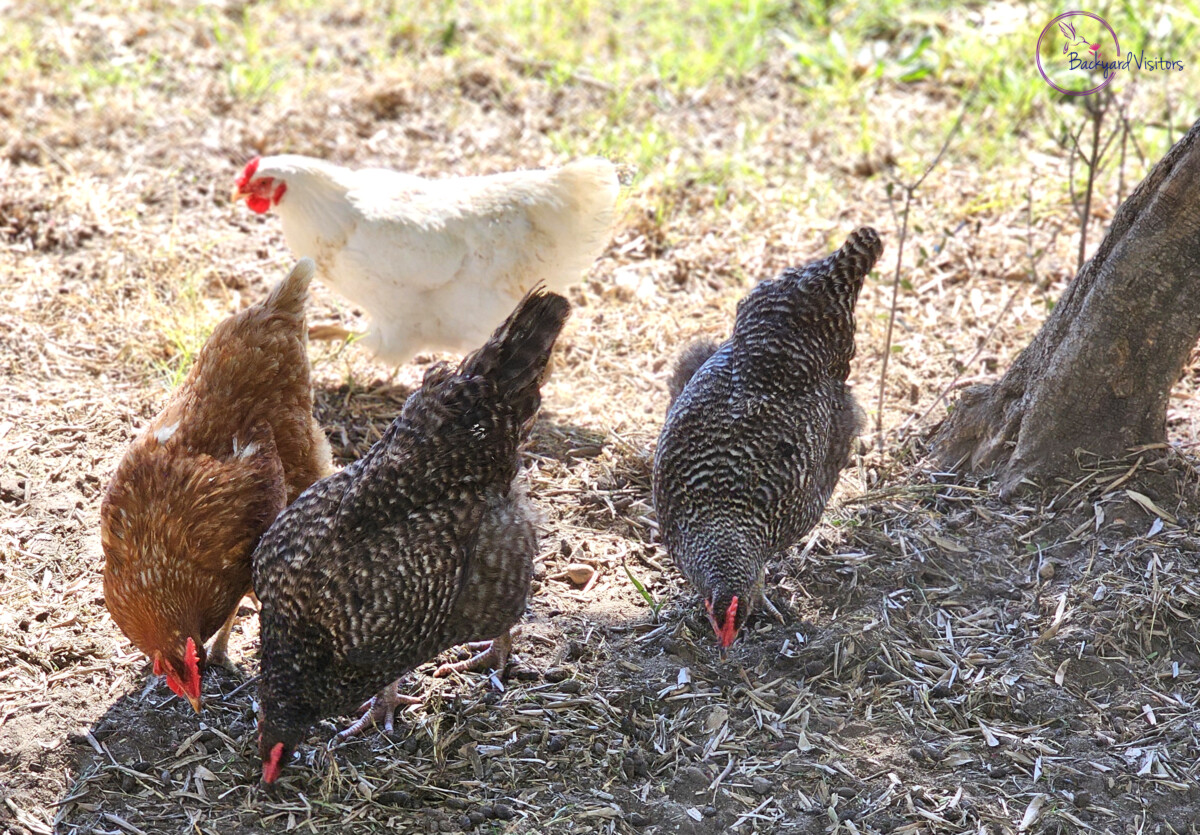
DIY projects can also enhance your care routine. Building treats or crafting boredom busters will keep your birds entertained. They will appreciate the attention to detail, and your efforts will contribute to their well-being. Your hens will thrive with the right daily care and attention. After all, raising chickens means creating a harmonious environment where your flock will flourish.
With a little planning and dedication, you will set yourself up for success and truly enjoy the process of raising backyard chickens. You will find it incredibly rewarding to see your flock happy, healthy, and productive.
Raising backyard chickens is a rewarding experience that provides fresh eggs and endless enjoyment. By understanding the needs and behaviors of your hens, you will quickly become adept at ensuring their well-being. From proper coop maintenance to monitoring for common health issues, a little knowledge goes a long way. Remember, a happy flock means happy hens and delicious, fresh eggs.
Check out my other posts on Backyard Chickens
Frequently Asked Questions
Q1: Are there any legal restrictions on keeping backyard chickens?
A1: Yes, local laws and ordinances vary by area. Some locales limit the number of hens you can keep or prohibit roosters due to noise issues. It’s crucial to check with your local city hall or municipal office to get the most accurate and updated information before starting your backyard flock.
Q2: Should I start with hatching eggs, day-old chicks, pullets, or adult birds?
A2: Each option comes with its own set of benefits and challenges. Hatching eggs provides the full experience but requires an incubator and careful monitoring. Day-old chicks are easier for bonding and diet control but need a brooder and temperature regulation. Pullets are easier to manage and will start laying soon, while adult hens provide immediate egg production but may come with unknown health issues.
Q3: How do I choose the right chicken breed for my backyard flock?
A3: Consider breeds that thrive in your local climate and meet your expectations for egg production and temperament. Research different breeds to find those best suited for your specific backyard setup and goals. Popular breeds for beginners include Rhode Island Reds, Buff Orpingtons, and Plymouth Rocks for their hardiness and friendly nature.
Q4: What are the essential elements of a chicken coop and run?
A4: A good chicken coop should be dry, well-ventilated, and easy to access. It must provide enough space for all hens to roost and lay eggs, with one nesting box per three hens. The run should be secure, spacious, and offer shaded areas to protect from the sun. Regular maintenance—cleaning the coop and replacing bedding—is key to preventing health issues.
Q5: What should I feed my chickens to keep them healthy?
A5: A balanced diet includes grains, proteins, and essential nutrients. Commercial chicken feed is a convenient option, but you can also mix your own feed. Supplements like oyster shells or crushed eggshells provide calcium for strong eggshells, while grit helps with digestion. Chick starter feed is higher in protein for young chicks, transitioning to grower feed and then layer feed as they mature. Always ensure freshwater is available.
Q6: Can I let my chickens free-range in my backyard?
A6: Free-ranging has benefits such as reducing feed costs and providing natural foraging opportunities, but it requires a safe, predator-proof area. Always supervise free-ranging to protect against common neighborhood predators and ensure the coop is accessible for the chickens to retreat to when necessary.
Q7: How do I maintain the health of my flock?
A7: Regularly check for signs of respiratory issues, parasites, and egg-binding. Provide proper ventilation and a dry environment to prevent health problems. Keep an eye on your flock’s laying habits and consult a vet if you notice any irregularities. Supplements like oyster shells and grit, along with a balanced diet and freshwater, are vital for maintaining health.
Q8: What daily tasks are involved in raising chickens?
A8: Daily care includes checking the coop’s security, providing fresh water and food, and observing your hens for any health issues. Collect eggs and clean nesting boxes regularly. Allow supervised free-ranging or ensure they have access to a secure run for exercise and mental stimulation.
Q9: Where can I get my first flock of chickens?
A9: Local hatcheries, farm supply stores, and online hatcheries are common sources for baby chicks. Farmers updating their flocks or community events like chicken swaps and fairs can also be good places to find hens. Ensure you choose reputable sources to guarantee the health of your flock.
Raising backyard chickens is a delightful and fulfilling journey. With proper planning, care, and attention, you’ll enjoy fresh eggs and the companionship of your feathered friends.
Happy Backyard Chicken Keeping!
Backyard Visitors is a participant in the Amazon Services LLC Associates Program, an affiliate advertising program designed to provide a means for sites to earn advertising fees by advertising and linking to Amazon.com. We also participate in other affiliate programs which compensate us for referring traffic.

